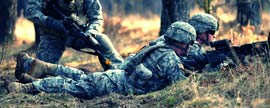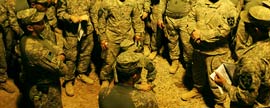Great Question! While I can understand that this is a frustrating issue and can be taken as a personal attack I would ask that you look at this from another perspective.
The CSM is charged with upholding the integrity of the evaluation process for NCOs. Therefore AR 623-3 and DA PAM 623-3 provides him/her the ability to review the reports. Now typically the goal of the CSM is to identify issues in which the standards:
1. Are not upheld. Meaning the comments do not support the rating. For example let’s say a Soldier receives a MET STANDARD and the bullet comments actually support an EXCELLENCE rating. Or the comments show a MET STANDARDS but the comments reflect a DID NOT MEET STANDARDS
Or
2. The report contains an inaccurate information such as: inaccurate counseling dates, incorrect administrative information, etc.
Then the CSM has several options:
1. He can discuss the issue with the rater & senior rater to seek reasonable resolution based on the facts of the matter. If this attempt is unsuccessful then
2. He/she can discuss the issue with the reviewer. The reviewer can then decide to concur with the rater & senior rater or non-concur and attach a memo to the report.
Under no condition can the CSM require a rating to be changed. Furthermore AR 623-3 requires a supplementary review. The review requirement can be found on page 15-16 of AR 623-3. It states:
2-8b(2)(a) Supplementary review requirement.
A mandatory supplementary review is required for NCOERs when a senior rater within the rated NCOs rating chain includes an NCO in the rank of SFC through 1SG/MSG, warrant officers in the rank of WO1 through CW2, and Army officer in the rank of 2LT and 1LT. This supplementary review will be performed by a uniformed Army Soldier, senior to the senior rater within the rated NCO’s organization in the rank of SGM/CSM, CW3 through CW5, or CPT and above. This Army Soldier will be designated as a Uniformed Army Advisor. The Uniformed Army Advisor will monitor evaluation practices, and provide assistance and advice needed to rating officials (as required) on matters pertaining to Army evaluations. This Uniformed Army Advisor will be identified on the published rating scheme at the beginning of the evaluation period by the CDR establishing the rating chain.2-8b(2)(b) Mandatory supplementary reviews are also required when no uniformed Army-designated rating officials exist in the rating chain. This also includes when the senior rater is other than a uniformed Army Soldier and a rater is an NCO in the rank of SGT through 1SG/MSG, warrant officers in the rank of WO1 through CW2, and Army officer in the rank of 2LT and 1LT. This supplementary review will be performed by a uniformed Army Soldier, senior to the senior rater within the rated NCO’s organization in the rank of CSM/SGM, CW3 through CW5, or CPT and above. This Army Soldier will be designated as a Uniformed Army Advisor. The Uniformed Army Advisor will monitor evaluation practices, and provide assistance and advice needed to rating officials (as required) on matters pertaining to Army evaluations. This Uniformed Army Advisor will be identified on the published rating scheme at the beginning of the evaluation period by the CDR establishing the rating chain.
Put simply if a leader his changing reports or forcing the change they are in violation of Army Policy/Regulation. Their supervisor should then consider taking action by counseling the leader, placing a comment on the leader’s evaluation report, or other corrective/punitive action.
Does this type of behavior happen? Yes, I have seen it happen and typically it is done with the best of intentions and not as a personal attack against the rated Soldier. In some cases the entire chain of command may not be educated on the regulatory requirements. I have found that typically when issues like this are approached in a professional and factual manner the issue is usually resolved in a professional and reasonable manner.
In the situations when common sense did not prevail and less than professional reasons were found to be the reason for the intervention by a senior leader I have seen senior leaders corrected in a manner appropriate to their unprofessional actions to include: administrative action (letters of reprimand, letters of concern, counseling statements, or comments on the offenders evaluation report) or punitive action in severe cases which might include an Article 15 .
Your options include:
- Requesting to see the individual in question with your rating chain to seek a reasonable and professional resolution.
- If that fails you can consider requesting to see the appropriate commander (Co/BN/BDE) on open door policy to correct the issue.
- You may also request a commander’s inquiry, you can appeal the NCOER, you can request an IG investigation for undue command influence.
In summary the leader in question (in this case the CSM) can request that the rater, senior rater and reviewer provide additional information to justify the ratings and/or comments but he/she cannot make a member of a rating chain change their rating.
Related Posts
Can a Reviewer require a rater and/or senior rater to make changes to an evaluation report?
Can my Rater falsify counseling dates on my NCOER?
How can I correct an Evaluation Report before it hits my records?
Can I be rated by individuals not in my official rating chain?
How should I respond when Leaders at a new unit ask for a copy of my previous NCOERs?
Other Items You May Find Userful:













